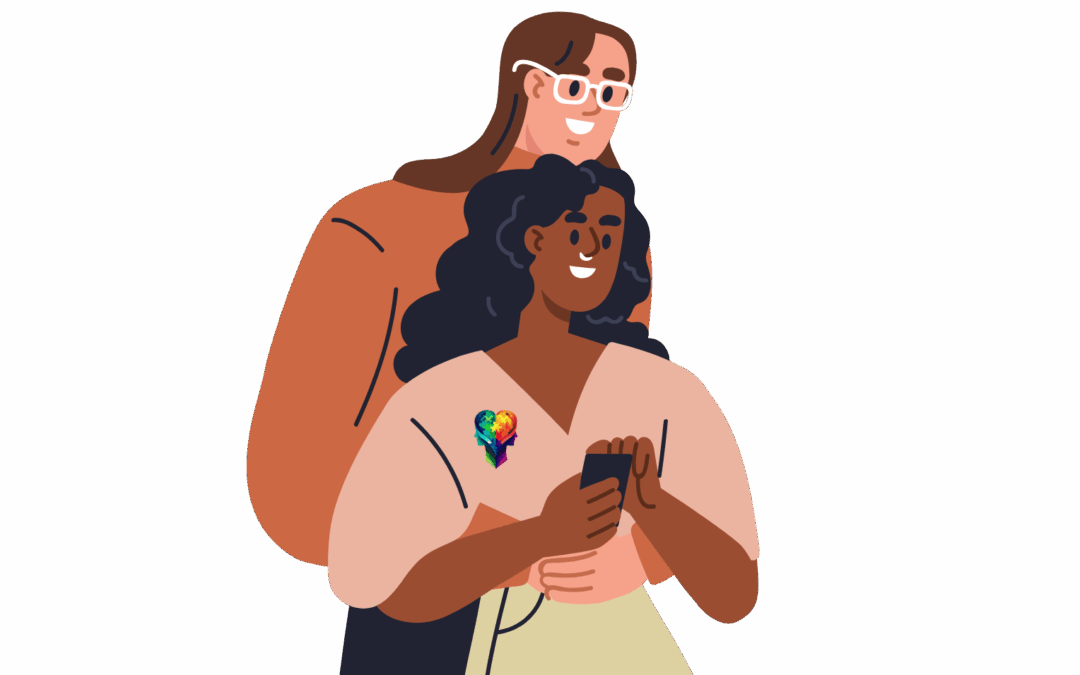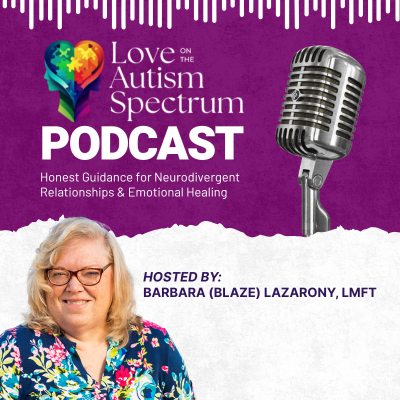Imagine being in a relationship with a neurodivergent individual where you don’t have to second-guess yourself—where communication feels honest, not hard, and where you both feel emotionally safe, even when things get messy. That kind of security is possible. In fact, it’s foundational to lasting connection, especially in neurodiverse relationships, where sensory sensitivity, processing styles, and emotional rhythms may not always match.
In this blog post, we’ll gently explore how to overcome insecurity in neurodiverse relationships, where it often comes from, and what it takes to create a stronger, more secure emotional bond. You may realize the importance of understanding your own feelings and the dynamics within these relationships, which often differ from societal expectations.
3 Key Takeaways
- Insecurity often stems from past trauma, attachment wounds, or communication mismatches, and healing begins with awareness and self-reflection.
- Strengthening your relationship requires a combination of emotional insight, direct communication, and compassionate personal growth. Setting realistic expectations and discussing them openly can foster intimacy and understanding, helping to prevent misunderstandings and emotional discomfort.
- Support from a neurodiversity-affirming therapist can help partners move from patterns of fear and shutdown into a relationship built on mutual trust and emotional safety.
An Introduction to Neurodiverse Relationships
Neurodiverse relationships involve a neurotypical partner and a neurodivergent partner, such as an autistic person. These relationships can be incredibly rewarding, but they also present unique challenges. Understanding and accepting the differences between neurotypical and neurodivergent individuals is crucial for building a strong and healthy relationship. Neurodivergent people, including autistic individuals, may experience emotional development and attachment styles differently than their neurotypical partners. By recognizing and embracing these differences, couples can work together to create a supportive and loving environment. This mutual understanding fosters a deeper connection and helps both partners feel valued and respected.
Understanding Insecurity in Neurodiverse Relationships
Insecurity isn’t just a feeling—it’s a nervous system state. And in neurodiverse relationships, that state can be amplified when communication differences aren’t understood or when past experiences haven’t been fully processed.
You might notice yourself—or your partner—seeking constant reassurance, withdrawing, reacting with jealousy, or trying to control the environment to feel safe. These responses aren’t about being dramatic or difficult. They’re usually about survival.
Take Erin and Max (names changed). Erin was a late-diagnosed autistic person who often felt ignored in conversations with her partner, Max, who had ADHD. Max wasn’t trying to avoid her—he just processed conversations internally, with long silences that made Erin feel abandoned and sad. Once they recognized the pattern, they could name what was happening without blame. That was the start of their healing.
The Impact of Neurodivergence
Neurodivergence can significantly impact a relationship, particularly if one partner is autistic. Autistic people tend to experience and interpret the world differently, which can lead to misunderstandings and communication challenges. Neurodiverse relationships require effort and understanding from both partners to navigate these differences. The neurotypical partner may need to adapt their communication style and emotional expression to better support their autistic partner. Meanwhile, the autistic partner may need to develop strategies to manage their emotions and sensory experiences. By working together and seeking professional support, couples can build a stronger and more resilient relationship, turning potential challenges into opportunities for growth and deeper connection.
Where Insecurity in Neurodiverse Relationships Comes From
Past Relationship Experiences
If you’ve ever been ghosted, betrayed, emotionally neglected, or chronically misunderstood in previous relationships, your body remembers. Even if the current partner is safe, the nervous system may still be bracing for impact.
That’s why we sometimes respond with suspicion or withdrawal when none is warranted. We’re not reacting to the present moment—we’re reacting to an emotional echo. Naming those echoes helps them lose their grip.
Attachment Styles
Whether you lean anxious, avoidant, or somewhere in between, attachment styles often show up most clearly during conflict or vulnerability. If you grew up unsure whether your needs would be met, you might feel especially sensitive to moments of distance or disconnection.
An avoidant partner might pull away to self-regulate, while an anxious partner might pursue for closeness—each trying to feel safe in the only way they know how. Understanding your own attachment style is a powerful step toward softening these patterns.
Low Self-Esteem
Low self-worth can quietly fuel insecurity, especially among autistic people. If you don’t believe you’re lovable as you are, you might constantly question your partner’s affection or approval. This can lead to feelings of hurt, as misunderstandings and mismatched emotional needs create emotional pain and distress. You might compare yourself to others, feel overly sensitive to criticism, or find it hard to believe good things are real.
Therapy, affirmations, and embodied self-worth practices can help rebuild your relationship with yourself—because no partner can fill the hole left by self-doubt.
Communication Breakdowns
In neurodiverse relationships, including those with a neurotypical partner, communication differences can be profound. One partner may prefer direct speech; the other, subtle cues. One may need time to process; the other, instant feedback. Small talk can be particularly challenging, as it often leads to discomfort and sensory overload for neurodivergent individuals, creating stress and misunderstanding. Without shared understanding, it’s easy to misinterpret pauses, tone, or facial expressions.
That’s why open, clear, and compassionate communication is essential. It’s not about being perfect—it’s about staying in dialogue.
Strategies for Healing Insecurity in Neurodiverse Relationships
Self-Reflection and Personal Growth
You can’t change what you don’t name. Journaling, therapy, or simply slowing down to ask, “What’s really going on inside me right now?” can be transformative. When you notice yourself spiraling, pause and check in with your body. What’s the fear? Where does it come from? What part of you needs comfort, not correction? Embracing the idea of personal growth and self-discovery can be liberating and validating.
This work doesn’t mean blaming yourself—it means becoming the safest person you know.
Open and Honest Communication
Create space for vulnerable conversations. Try saying, “When you didn’t respond to my text, my brain went to a scary place. Can we talk about that?” Keep the focus on your internal experience, not your partner’s intention. It’s important not to assume negative motivations behind your partner’s actions. By questioning these assumptions, you can foster better understanding and strengthen your relationship.
Neurodiverse love often requires extra clarity and extra grace. You may need to say what you mean, mean what you say, and check in more often than you’d expect. That’s not failure—that’s partnership.
Challenge Negative Self-Talk
Our thoughts can be ruthless. “I’m too much.” “They’re going to leave.” “I’m unlovable.” These stories often aren’t true, but they feel real. For autistic individuals, the worry of dating and romance can add to these negative thoughts. The pressure of explaining a disability can be overwhelming, but learning to spot these patterns, question them, and replace them with more compassionate language is part of building internal security.
Cognitive-behavioral tools, somatic work, or even speaking your inner critic out loud (and giving it a silly voice) can interrupt the spiral.
Building Trust and Safety with an Autistic or ADHD Partner
Building trust and safety is essential in any relationship, but it can be particularly challenging in neurodiverse relationships. Autistic individuals may struggle with social interactions and emotional regulation, which can lead to feelings of anxiety and self-doubt. To build trust and safety, the neurotypical partner should prioritize open and honest communication, actively listening to their autistic partner’s needs and concerns. The autistic partner should also feel comfortable expressing their emotions and boundaries, without fear of judgment or rejection. By establishing a safe and supportive environment, couples can foster a deeper sense of trust and connection, ensuring that both partners feel secure and understood.
For an ADHD partner, it is essential to understand their own needs and limitations, as well as those of their partner. This can include finding ways to manage impulsivity and forgetfulness, such as using reminders or setting up a routine. It’s also crucial for the neurotypical partner to be patient and understanding when their ADHD partner may struggle with time management or organization. By working together and finding strategies that work for both partners, an Autism or ADHD and Neurotypical relationship can thrive.
The Role of Self-Care
Self-care is critical in neurodiverse relationships, as it can help both partners manage stress and emotional overwhelm. The neurotypical partner may need to prioritize self-care to cope with the challenges of supporting their autistic partner. Meanwhile, the autistic partner may need to develop self-care strategies to manage their sensory experiences and emotional regulation. By prioritizing self-care, couples can maintain their emotional and physical well-being, reducing the risk of burnout and relationship strain. Self-care can include activities such as exercise, meditation, and spending time in nature, as well as seeking professional support and connecting with supportive communities. These practices help both partners recharge and maintain a healthy balance in their relationship.
Neurodiverse Relationships and Community
Neurodiverse relationships can be isolating, particularly if the couple struggles to find supportive communities and resources. However, there are many online and in-person communities dedicated to supporting neurodiverse couples and individuals. These communities can provide a sense of connection and belonging, as well as valuable resources and advice for navigating the challenges of neurodiverse relationships. By connecting with others who share similar experiences, couples can feel less alone and more supported, reducing feelings of loneliness and isolation. Additionally, these communities can help couples access professional support and services, such as counseling and therapy, to further support their relationship. Engaging with a community can be a lifeline, offering both practical advice and emotional support.
When to Seek Professional Support
You don’t have to do this alone; seeking emotional support can be beneficial. A therapist trained in neurodiversity-affirming care can help you identify patterns, regulate your nervous system, and rebuild emotional safety. I specialise in working with neurodiverse couples, especially those who struggle with insecurity in their neurodiverse relationship! Reach out today to schedule your FREE “Clarity & Connection” Zoom session.
Whether you’re healing from trauma, exploring your attachment style, or learning how to communicate in a neurodiverse relationship, professional support can offer you the tools and insight to move forward—not perfectly, but meaningfully. For a neurodiverse couple, understanding the differences between neurotypical and neurodivergent partners is crucial. Professional guidance can help navigate these differences, fostering greater intimacy and connection despite inherent distinctions.
Summary: Creating Security Together
No relationship is perfect. However, a secure neurodiverse relationship is one where both partners feel emotionally seen, physically safe, and allowed to be their full selves. It’s not about never feeling insecure—it’s about knowing what to do when those feelings show up. Navigating the complexities of life together, especially through personal journeys and emotional challenges, can lead to a deeper connection and mutual support.
With curiosity, courage, and a commitment to growth, you can build a relationship that’s not just surviving, but thriving.
You deserve that. And it’s absolutely possible.
Frequently Asked Questions
How do I stop feeling insecure in my relationship?
Start by slowing down and naming what you’re feeling. Insecurity is often a sign that a need hasn’t been met or a past wound has been touched. Practice self-compassion, communicate openly with your partner, and seek therapeutic support if the patterns feel too big to untangle alone. It’s also crucial to understand that in neurodiverse relationships, partners may struggle to fully comprehend each other’s emotional and cognitive experiences. By acknowledging and actively working to understand these differences, couples can foster deeper connections and healthier communication.
How can I explain my insecurity to my partner?
Try using “I” language and be specific. For example: “When I don’t hear back from you, I notice I start to feel scared that something’s wrong. I know that’s about me, not you—but I’d love to find a way we can navigate this together.” It’s important that these feelings are talked about openly, especially when discussing sensitive topics like mental health, relationships, and consent. This is crucial for neurodivergent individuals who may struggle to express their feelings and often feel excluded from important conversations.
What if my partner is the insecure one?
Be gentle, but clear. Offer reassurance where you can, but also set boundaries around repeated behaviors like jealousy or control. Emphasize the importance of mutual respect in your relationship, as understanding and valuing each other’s unique experiences can foster a deeper connection. Invite them into conversation, not confrontation. And if needed, recommend couples counseling as a safe space to unpack the deeper dynamics together.
Can insecurity really be healed?
Yes—though not overnight. Insecurity is often a reflection of unmet needs or past pain. In neurodiverse relationships, this can be particularly challenging, as partners may struggle with the emotional pain and distress of feeling misunderstood or hurting each other unintentionally. With time, consistent relational safety, and often therapeutic support, those old wounds can be soothed. Healing is possible—and worth the effort.







